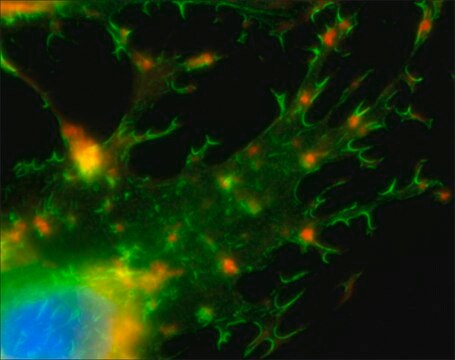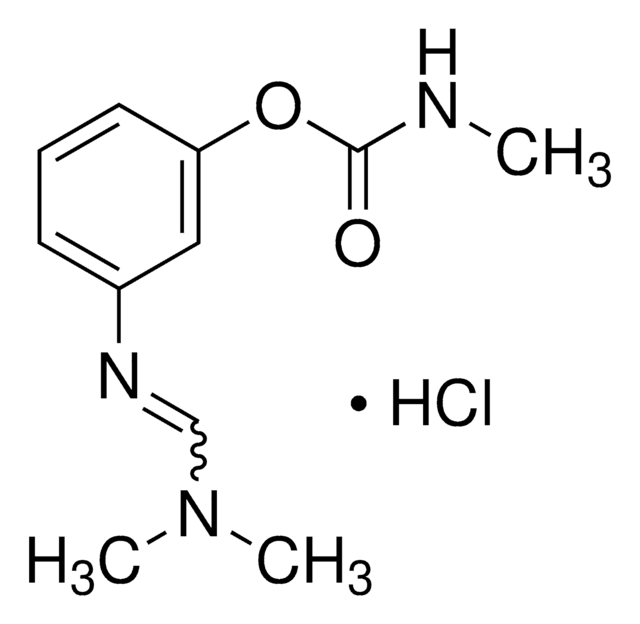55212
Phalloidin–Atto Rho6G
suitable for fluorescence, ≥90% (HPCE)
Autenticatiper visualizzare i prezzi riservati alla tua organizzazione & contrattuali
About This Item
Codice UNSPSC:
12352200
NACRES:
NA.32
Prodotti consigliati
Livello qualitativo
Saggio
≥90% (HPCE)
Forma fisica
solid
PM
Mw 1396 g/mol
Produttore/marchio commerciale
ATTO-TEC GmbH
Fluorescenza
λex 535 nm; λem 560 nm in 0.1 M phosphate pH 7.0
Compatibilità
suitable for fluorescence
Temperatura di conservazione
−20°C
Descrizione generale
Atto Rho6G is a novel fluorescent label that belongs to the class of Rhodamine dyes. It shows a strong absorption, extraordinary high fluorescence quantum yield, high thermal and photostability, and a very little triplet formation. Atto Rho6G is moderately hydrophilic.Phalloidin is a fungal toxin isolated from the poisonous mushroom Amanita phalloides. Its toxicity is attributed to the ability to bind F-actin in liver and muscle cells. As a result of binding phalloidin, actin filaments become strongly stabilized. Phalloidin has been found to bind only to polymeric and oligomeric forms of actin, and not to monomeric actin. The dissociation constant of the actin-phalloidin complex has been determined to be on the order of 3 x 10–8. Phalloidin differs from amanitin in rapidity of action; at high dose levels, death of mice or rats occurs within 1 or 2 hours.
Applicazioni
Fluorescent conjugates of phalloidin, rhodamine-phalloidin staining reagents, such as Phalloidin–Atto Rho6G are used to label actin filaments for histological applications. Some structural features of phalloidin are required for the binding to actin. However, the side chain of amino acid 7 (g-dihydroxyleucine) is accessible for chemical modifications without appreciable loss of affinity for actin.
Note legali
This product is for Research use only. In case of intended commercialization, please contact the IP-holder (ATTO-TEC GmbH, Germany) for licensing.
Certificati d'analisi (COA)
Cerca il Certificati d'analisi (COA) digitando il numero di lotto/batch corrispondente. I numeri di lotto o di batch sono stampati sull'etichetta dei prodotti dopo la parola ‘Lotto’ o ‘Batch’.
Possiedi già questo prodotto?
I documenti relativi ai prodotti acquistati recentemente sono disponibili nell’Archivio dei documenti.
Marjolein B M Meddens et al.
Microscopy and microanalysis : the official journal of Microscopy Society of America, Microbeam Analysis Society, Microscopical Society of Canada, 19(1), 180-189 (2013-01-26)
Podosomes are cellular adhesion structures involved in matrix degradation and invasion that comprise an actin core and a ring of cytoskeletal adaptor proteins. They are most often identified by staining with phalloidin, which binds F-actin and therefore visualizes the core.
Ana Vicente-Sánchez et al.
Molecular brain, 6, 42-42 (2013-10-08)
G protein-coupled receptors (GPCRs) are the targets of a large number of drugs currently in therapeutic use. Likewise, the glutamate ionotropic N-methyl-D-aspartate receptor (NMDAR) has been implicated in certain neurological disorders, such as neurodegeration, neuropathic pain and mood disorders, as
Magdalena Izdebska et al.
Acta histochemica, 115(5), 487-495 (2013-01-15)
Quantum dots (QDs) are fluorescent nanocrystals whose unique properties are fundamentally different from organic fluorophores. Moreover, their cores display sufficient electron density to be visible under transmission electron microscopy (TEM). Here, we report a technique for phalloidin-based TEM detection of
Models of the collective behavior of proteins in cells: tubulin, actin and motor proteins.
Tuszynski JA, Brown JA, Sept D.
J. Biol. Physics, 29, 401-428 (2003)
J E Bowe et al.
Diabetologia, 56(4), 783-791 (2013-01-25)
Glucose plays two distinct roles in regulating insulin secretion from beta cells--an initiatory role, and a permissive role enabling receptor-operated secretagogues to potentiate glucose-induced insulin secretion. The molecular mechanisms underlying the permissive effects of glucose on receptor-operated insulin secretion remain
Il team dei nostri ricercatori vanta grande esperienza in tutte le aree della ricerca quali Life Science, scienza dei materiali, sintesi chimica, cromatografia, discipline analitiche, ecc..
Contatta l'Assistenza Tecnica.






